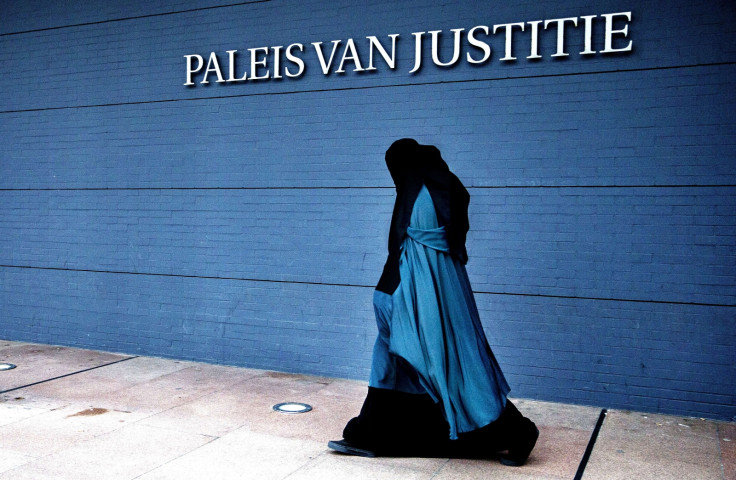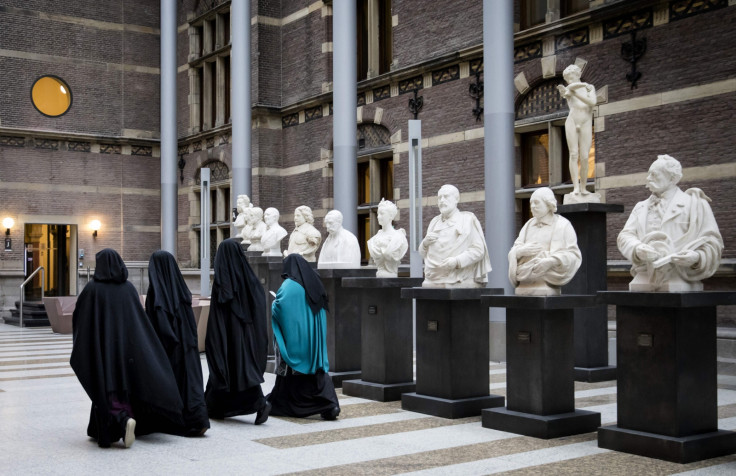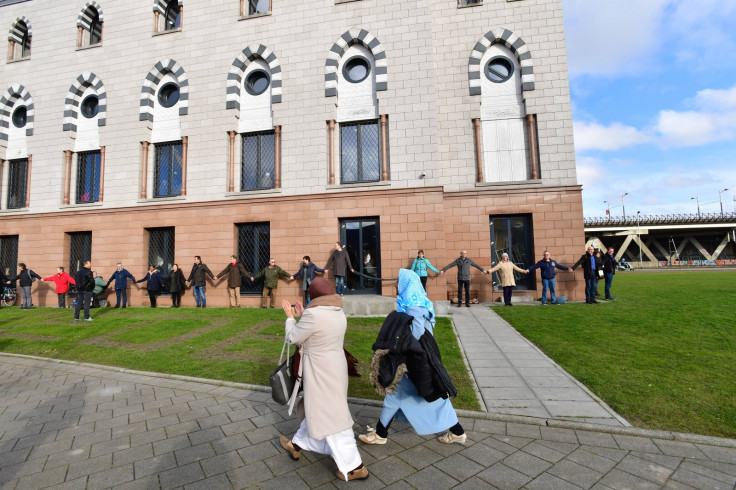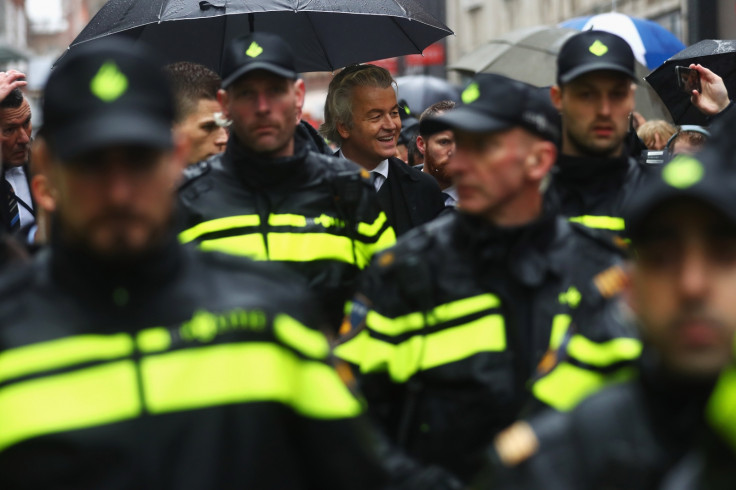Dutch Muslims 'will not be silenced' by Geert Wilders and the politics of fear
Muslims are afraid for the future in the Netherlands amidst rise in Islamophobic attacks.

Dutch far-right politician Geert Wilders, who is expected to win 13% of votes in the election on 15 March, has vowed to 'de-Islamise' the Netherlands by closing all mosques and Islamic schools.
The leader of the Freedom Party (PVV) has called for the banning of Sharia law and compared the Quran to Mein Kampf, claiming it is full of "calls inciting violence".
His conviction for hate speech in December 2016 has done little to soften his stance on Muslims and immigrants. After US President Donald Trump brought in a travel ban on citizens from seven majority-Muslim nations, Wilders called for a total ban on immigration from Islamic countries. At his campaign launch he referred to Moroccans as "scum" and promised that his party would "make the Netherlands for Dutch people again".
Although Wilders is unlikely to be in the coalition – all major parties have ruled out collaborating with him – Dutch Muslims are afraid. They say Wilders' rhetoric is fuelling anti-Islamic sentiment in the Netherlands and has left many Muslims feeling unsafe and no longer welcome in their own country.

Politics of fear
"Muslims are afraid because they feel they are getting less and less room to be themselves in [our] society," says Marianne Vorthoren, the director of the Platform for Islamic Societies in Rotterdam (SPIOR). "It is not just a feeling, it is our reality. We are seeing an increase in Islamophobic attacks.
"[Muslims] tell us that they have decided to no longer wear their headscarf because they don't feel safe [doing so]. This is a sad fact for our society that people feel 'I have to hide myself to be safe.'"
"The Netherlands is transforming from a tolerant country into a fearful nation," says Ertugrul Gokcekuyu, the vice-rector of the Islamic University in Rotterdam. "This political climate does not serve the public good. It just makes it more dangerous."
With Islamophobic incidents on the rise and the PVV predicted to become the second largest party in parliament, Muslims in the Netherlands are concerned about what the future holds.
Islamophobia in the Netherlands
In 2015, anti-discrimination monitors across the Netherlands received 240 reports of religious discrimination against Muslims, 72% of the total number of discrimination cases. Discrimination against Muslims in Rotterdam doubled in comparison with 2014, according to police statistics.
Source: SPIOR report 'Islamofobie in zicht'
"For a long time Muslim communities felt that there was more attention for anti-Semitism and homophobia than there was for Islamophobia," according to Marianne Vorthoren of the Platform for Islamic Societies in Rotterdam. There are "double standards" in the way authorities deal with discrimination cases, she says. "Recently a man changed all the references to Islam and Muslims in a PVV pamphlet to Judaism and Jews. He stood on Dam Square in Amsterdam handing them out and was arrested on the spot."
In 2016, SPIOR received €28,000 (£24,420, $29,890) from philanthropist George Soros' Open Society Foundation to fund several projects tackling Islamophobia, including the launch of an anti-discrimination monitor for Muslims. Vorthoren says current statistics show an increase in Islamophobic incidents but only reveal the "tip of the iceberg". "So many Muslims do not report [discrimination] because they fear it will have negative consequences," she says.
"Islam is part of the multicultural Dutch society"
Prime Minister Mark Rutte was accused of pandering to PVV voters after he published an open letter telling immigrants who do not respect Dutch values to leave.
Imam Azzedine Karrat of the Essalam Mosque in Rotterdam, the country's largest mosque, says such rhetoric is divisive and fails to recognise that "Islam is a European and Dutch religion".
"[If the prime minister is suggesting] that Muslims and other ethnic minorities have to adapt, push aside their identity to be party of Dutch society, then I say to Mr Rutte: 'You are wrong, your norms and values are not those of Dutch society.' Those values are formed by the multicultural society and by the power of diversity. Muslims should be accepted as part of Dutch society," he tells IBTimes UK.
Gokcekuyu says many politicians are failing and refusing to recognise that "Western societies are multicultural" and are trying to constrain people's sense of identity and autonomy.
"It's come to a point that politics is telling us how to feel, what to feel, what to think. I think that is too much politics."
[Box next to Imam Karrat video]
After a terrorist opened fire at a mosque in Quebec, Canada, killing six people, Dutch people gathered to form a human shield around the Essalam Mosque in Rotterdam. They stood hand-in-hand around the mosque in solidarity with the victims and Muslims around the world. The mosque's Imam, Azzedine Karrat, described the solidarity ring as a "beautiful gesture" that shows "the power of diversity in our society" and how in the Netherlands "we stand up for each other and protect each other's rights as well as autonomy".
The 28-year-old Imam says he tries to remain positive, but admits that the terrorist attack in Quebec also left him feeling shaken.
"During one of the prayers I found myself thinking: 'What if someone comes in with a Kalashinkov or a bomb?' That is not something one should have to think about while praying."
He is steadfast in his conviction that solidarity and tolerance will overcome hate and fear in Dutch society. "After the heavy contractions, I hope a beautiful child will appear," he says.

Resisting Wilders' populist rhetoric
On 10 March representatives from the main political parties took part in a debate about Islam at the Essalam Mosque. Both the VVD and PVV declined the invitation. Wilders responded on Twitter: "No way. Except if I am allowed to close that mega mosque. And then the others #deislamisation."
The PVV leader has so far not taken part in a televised debate. His first and only appearance will be tonight (13 March), two days before the election, when he will debate his main rival and former coalition partner, Prime Minister Mark Rutte.
Gokcekuyu says it is problematic that Wilders "doesn't give the media and the public the opportunity to ask questions". At a debate he would not have "the option to hide" but would be forced to outline his vision for the Netherlands and engage with people who hold different opinions to him. "Differences are good. They just force us to respect each other."
"You have to debate, especially with the people you fundamentally disagree with. It's such an important aspect of our democratic system," says Vorthoren. "Wilders pretends that there is a simple situation with a simple solution. But that is not reality. We live in a complex reality and we have to look for solutions together."
Both Vorthoren and Gokcekuyu do not think Wilders is serious about being in the coalition as he would then be forced to make compromises. "The support his party has now is not based on constructive solutions and the willingness to compromise," says Vorthoren.
Encouraging Muslims to vote has always been difficult, Imam Karrat admits. "[Many of them] distrust the government. They think that even if they vote, nothing will change. But this year we will do our utmost as Muslims to ensure that our voices are loudly heard and to show that 'we are here and we should be taken into account'."
There is too much focus on the political extremes right now, Vorthoren says. We should not lose sight of the silent majority in the middle. "The majority of people [wish] to be connected with each other and to live together peacefully," she says. "I hope the silent majority will be represented [in politics]. In the end that is defining for the future of our country. The only way to change [what is happening right now] is to get involved and to make sure your voice is heard."
[Box next to Ertugrul Gokcekuyu video]
The political game populists play is dangerous, warns Ertugrul Gokcekuyu, the vice-rector of the Islamic University.
"[Politicians such as Wilders] are not interested in ruling or being in the government. [His interest] is in formulating one-liners and playing into [people's] fear. His populistic rhetoric goes against the grain of [our] rule of state and the constitutional existence that is the result of several centuries of struggle."
He says it is important to distinguish Islam from Islamism and ordinary Muslims from extremists. This can only be achieved if Muslims are represented in parliament and they are encouraged to take part in the political debate.

Perils of perception
The perception of the number of Muslims in the Netherlands greatly outstrips reality.
A 2016 Ipsos poll of 27,250 across 40 countries found most Dutch believed 19% of the country's 17 million population is Muslim, rather than the actual 6%.
When asked to predict what percentage the Muslim community will make up in 2020, the average answer was 26%, significantly higher than the projection of 6.9%.
Source: Ipsos Perils of Perception 2016

Immigration figures
In 2016, 18,171 people claimed asylum in the Netherlands, more than 50% less compared with the previous year (43,093). Most asylum seekers came from Syria (2,158) and Albania (1,664). The significant drop in immigration was due to an EU deal with Turkey that curbed the number of migrants entering Europe.
Immigrants (1st and 2nd generation) made up 22% of the total population (16,979,120) in 2016. The largest immigration groups in The Netherlands are Moroccans (385,761) and Turks (397,471).
Source: Vluchtelingen Werk Nederland and CBS
© Copyright IBTimes 2025. All rights reserved.





















